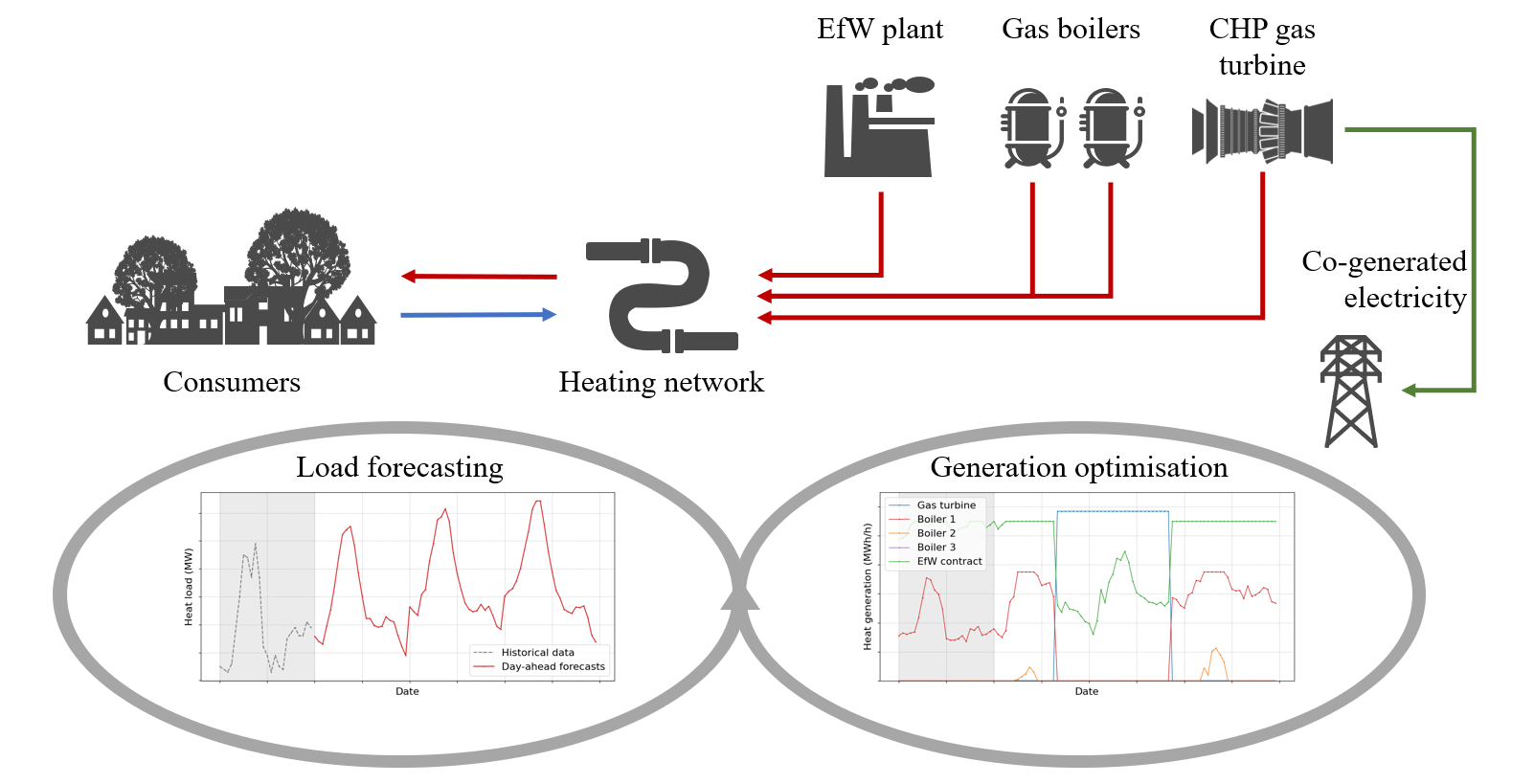Resource-optimised generation dispatch strategy for district heating systems using dynamic hierarchical optimisation
- Developed heat generation optimisation framework for district heating providers.
- Identified key cost drivers using a detailed sensitivity analysis.
- Developed high accuracy time series forecasting models for key input variables.
- Assessed optimisation effectivity using a German municipal utility case study.
- Improvement potential for operational cost and CO2 emissions both exceed 20%.
 District heating is expected to play an essential role in the cost-effective decarbonisation strategy of many countries. Resource-optimised management of district heating networks depends on a wide range of factors, including demand forecasting, operational flexibility, and increasingly volatile market conditions. However, traditional operations often still rely on static models and rather simple heuristics, while holistic optimisation requires dynamic cross-domain interoperability to allow the consideration of all these factors. This paper demonstrates a proof-of-concept for a knowledge graph based optimisation problem to minimise total heat generation cost for a district heating provider. The optimisation follows a hierarchical approach based on a merit-order principle and is embedded in a model predictive control framework to allow the system to incorporate most recent information and react to disturbances promptly. A detailed sensitivity study is conducted to identify key model parameters and assess the impact of anticipated changes in regulation and market conditions. Simulation-based optimisation is used to determine the short-term heat generation mix based on data-driven gas consumption models and day-ahead forecasts for the network’s energy demand and grid temperatures. Seasonal autoregressive integrated moving average models with exogenous predictor variables are found to be sufficiently accurate and precise. The effectiveness of the approach is demonstrated for a case study of an existing heating network of a midsize town in Germany, where a reduction of approximately 20% and 40% compared to baseline operational data is obtained for operating cost and CO2 emissions, respectively.
District heating is expected to play an essential role in the cost-effective decarbonisation strategy of many countries. Resource-optimised management of district heating networks depends on a wide range of factors, including demand forecasting, operational flexibility, and increasingly volatile market conditions. However, traditional operations often still rely on static models and rather simple heuristics, while holistic optimisation requires dynamic cross-domain interoperability to allow the consideration of all these factors. This paper demonstrates a proof-of-concept for a knowledge graph based optimisation problem to minimise total heat generation cost for a district heating provider. The optimisation follows a hierarchical approach based on a merit-order principle and is embedded in a model predictive control framework to allow the system to incorporate most recent information and react to disturbances promptly. A detailed sensitivity study is conducted to identify key model parameters and assess the impact of anticipated changes in regulation and market conditions. Simulation-based optimisation is used to determine the short-term heat generation mix based on data-driven gas consumption models and day-ahead forecasts for the network’s energy demand and grid temperatures. Seasonal autoregressive integrated moving average models with exogenous predictor variables are found to be sufficiently accurate and precise. The effectiveness of the approach is demonstrated for a case study of an existing heating network of a midsize town in Germany, where a reduction of approximately 20% and 40% compared to baseline operational data is obtained for operating cost and CO2 emissions, respectively.
- This paper draws from preprint 275: Sustainable operation of district heating systems using dynamic hierarchical optimisation
- Access the article at the publisher: DOI: 10.1016/j.apenergy.2021.117877



